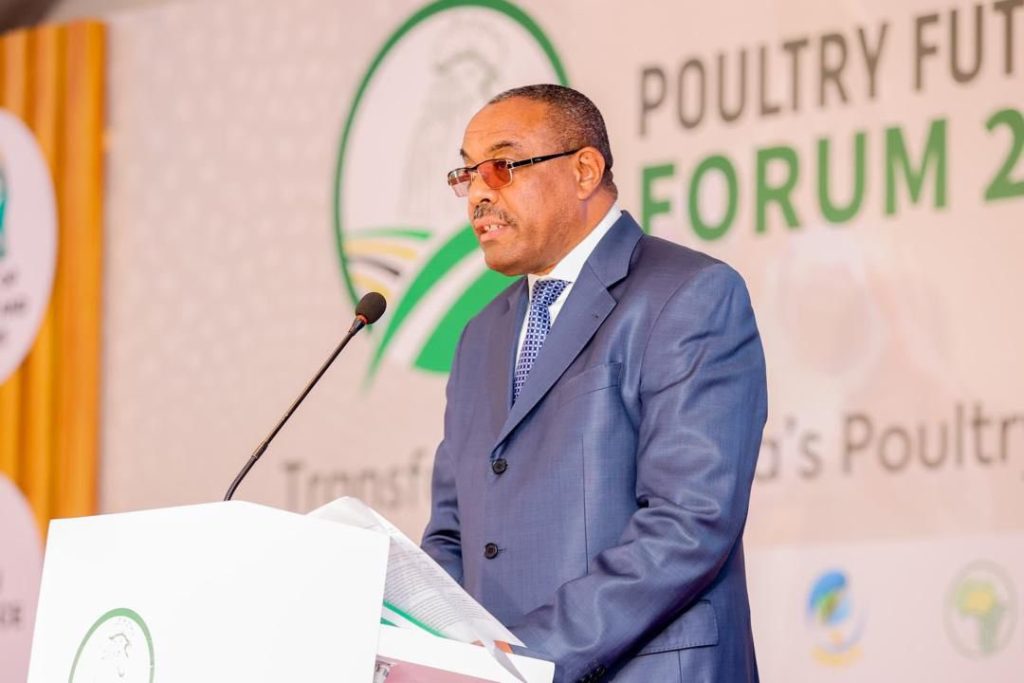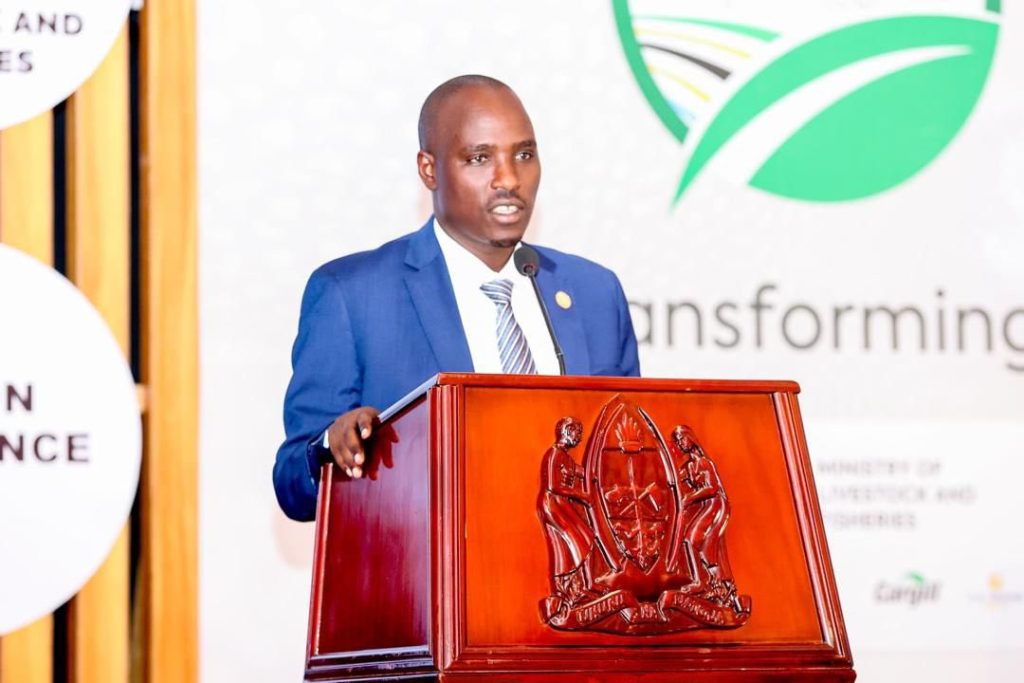Dar es Salaam, October 16, 2024 – The Poultry Futures Forum 2024, held in Dar es Salaam, brought together key stakeholders, including youth, policymakers, and industry leaders from across Southern Africa, to discuss the future of the poultry industry and its role in achieving food security. The two-day event focused on empowering youth and promoting gender inclusion as critical components for advancing regional poultry farming.
Representatives from 23 countries, including Malawi, Botswana, Mozambique, and Tanzania, shared insights on innovations, sustainability, and the importance of collaboration in transforming the poultry sector into a commercially viable industry.
Key Highlights from the Forum:
Deputy Prime Minister Hon. Dr. Doto Biteko (Representing Vice President Hon. Dr. Philip Mpango)
Tanzania’s Deputy Prime Minister, Hon. Dr. Doto Biteko, who represented Vice President Hon. Dr. Philip Mpango officially opened the forum, emphasized the role of regional collaboration and youth engagement in boosting the poultry sector.
“This is a consultative forum where we want to share experiences across several member states and learn from each other, where we can complement each other,” said Hon. Dr. Biteko. He further emphasized the need for greater investment in poultry as a pillar of food security in Tanzania and across Africa.
He welcomed international delegates, urging them to feel at home in Tanzania and explore the country’s rich culture. He noted, “Everyone from outside Tanzania, please feel at home. This is your home. We are committed to working together to make poultry farming a sustainable and profitable sector for all.”
Former Prime Minister of Ethiopia & AGRA Board Chair, Hailemariam Desalegn
The AGRA Board Chair and former Prime Minister of Ethiopia, Hailemariam Desalegn, who also serves as the Co-Chair of Tanzania’s Presidential Food and Agriculture Delivery Council, praised Tanzania’s efforts in advancing agriculture, particularly under the leadership of President Dr Samia Suluhu Hassan.
“Tanzania has demonstrated strong leadership in promoting agriculture as a key pillar of economic development and food security. The Poultry Futures Forum is a testament to the country’s commitment to advancing the poultry sector and ensuring sustainable growth for all,” Hailemariam said.
He emphasized the need for multi-stakeholder collaboration to fully transform the poultry sector, highlighting that poultry farming presents vast opportunities for job creation, food security, and youth empowerment.
“A true transformation of our poultry sector at scale will require us to rise to the challenge of deliberate and productive regional collaboration,” he stated. Hailemariam commended the Tanzanian government for fostering an inclusive approach, adding that “it is entirely in our control to develop shared vision and structures that help us transform the sector. Tanzania is leading by example in showing how to engage youth and women in agriculture to achieve sustainable food systems.”
Hailemariam noted that poultry has the potential to meet the growing demand for protein in Africa and stressed that integrating young people and women into the sector is critical.
He further emphasized that “it is entirely in our control to develop shared vision and structures that help us transform the sector. It is entirely in our control to collaborate better, to implement better.”
Hon. Abdallah Ulega, the Minister of Livestock and Fisheries of Tanzania, delivered a key message emphasizing the critical role of the poultry sector in achieving food security and economic growth in the country. He highlighted the government’s commitment to supporting the sector, particularly through initiatives aimed at youth empowerment, innovation, and sustainability.
Hon. Ulega expressed his optimism for the future of the poultry industry, acknowledging the challenges faced but reaffirming the government’s dedication to overcoming them.
“The poultry sector is one of the most important pillars of our agricultural economy. It provides jobs, improves nutrition, and contributes significantly to our national food security. Our mission is to ensure that this sector thrives through investment in infrastructure, technology, and especially the empowerment of our youth,” Hon. Ulega said.
He also noted the importance of public-private partnerships in advancing the poultry sector and called for greater collaboration among stakeholders, including the private sector, development partners, and financial institutions, to ensure that the poultry industry continues to grow and evolve.
Geoffrey Kirenga, CEO of SAGCOT Centre, added a light-hearted yet impactful message during his remarks at the Poultry Futures Forum 2024, using the example of Tanzania’s beloved dish, Chips Mayai (Egg and Chips), to illustrate the cultural and economic significance of poultry products in the country.
“Tanzania has been innovating, even in our food sector. There is a book published in Europe with over 100 recipes for potatoes, and one of them is from Tanzania—our famous Chips Mayai!” Kirenga shared, adding a personal touch to highlight the everyday relevance of eggs and poultry in Tanzanian households.
He emphasized the importance of the poultry sector, not just for its role in nutrition and food security, but also as a key part of Tanzanian culture. Chips Mayai, a staple street food made with eggs, represents the broader potential of the poultry industry to contribute to both national pride and economic growth.
“The main ingredient in this dish is eggs, which brings us back to the importance of supporting our poultry sector. Poultry farming provides not only essential nutrition but also income for thousands of families. We must continue to strengthen this sector through innovation and investment,” Kirenga concluded.
Vianey Rweyendela, Country Director of AGRA Tanzania, emphasized the critical importance of the poultry sector as a key component of Tanzania’s food systems. He noted that AGRA began focusing on the poultry subsector in response to a direct request from the Ministry of Livestock and Fisheries, recognizing its potential to drive both food security and economic growth.
“The poultry sector is a vital part of our food systems. After the Ministry’s request, AGRA has been working closely with stakeholders to develop this promising subsector, which offers tremendous potential across various fronts—improving nutrition, boosting household incomes, and contributing to national economic growth,” Rweyendela explained.
Omari Musa – Tanzanian Youth Farmer
One of the standout voices from Tanzania was Omari Musa, a young poultry farmer who is driving the shift from traditional poultry keeping to commercial farming with the support of initiatives like TangaYetu and AKM Glitters.
“Our families have always raised chickens, but now it’s time to move towards commercial poultry farming. With the backing of initiatives like TangaYetu and AKM Glitters, supported by Fondation Botnar, we can lead this transformation and build sustainable businesses,” said Omari. He highlighted the role of financial access for youth, referencing EFTA, which provides loans covering 75% of startup costs, enabling young farmers to expand their operations.
Grace Gondwe – Malawian Youth Farmer
From Malawi, Grace Gondwe shared her inspiring story of using technology to address challenges in poultry farming. Initially struggling with broiler production due to high costs and monopolized markets, Grace shifted her focus to indigenous chickens and developed a feed optimization software that has transformed her business.
“We created a software that allows farmers to formulate feed unique to their needs. This innovation has reduced costs and increased profitability by over 10%, making poultry farming more sustainable for young farmers,” Grace explained. She called on investors and stakeholders to support youth-driven innovations in agriculture, stating, “We need your support to scale up our innovations and build a stronger, more sustainable poultry industry.”



